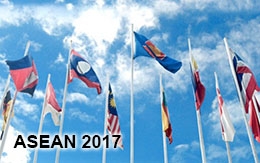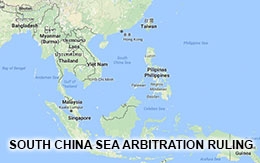Search result for "Philippines"
-
Possible Consequences of the Philippines’ South China SeaCategory: SecurityPRC dredgers have created a land mass that spans the entire existing reef and is approximately 3,000 meters long and 200-300 meters wide. China is currently building an airstrip with an estimated final length of 3,110 meters, long enough to allow any PRC military aircraft to land. AMTI has obtained and released the first publicly available photos of this airstrip development. China has also begun development of port facilities which may be capable of docking military tankers. What will the implications of this development be for the region?
-
Philippines and Japan Strengthen a Twenty-First
 Category: SecurityPhilippines’ approach took China by surprise. Beijing is by no means prepared to settle the South China Sea disputes through legal means. Chinese foreign policy elites are not convinced that the arbitration is about legal contestations between the Philippines and China at all. Many of them firmly believe that Washington has been heavily involved from the beginning, and that Manila initiated the case to provoke and put political pressure on Beijing. These elites point to the coincidental timing of various decisions by the tribunal and U.S. activities in the Asia Pacific. Chinese maritime lawyers claim that there are numerous weaknesses and ...
Category: SecurityPhilippines’ approach took China by surprise. Beijing is by no means prepared to settle the South China Sea disputes through legal means. Chinese foreign policy elites are not convinced that the arbitration is about legal contestations between the Philippines and China at all. Many of them firmly believe that Washington has been heavily involved from the beginning, and that Manila initiated the case to provoke and put political pressure on Beijing. These elites point to the coincidental timing of various decisions by the tribunal and U.S. activities in the Asia Pacific. Chinese maritime lawyers claim that there are numerous weaknesses and ... -
PHILIPPINES AND JAPAN STRENGTHEN A TWENTY
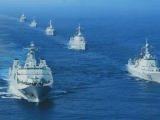 Category: PoliticsDuring a bilateral meeting at the November 18-19 Asia-Pacific Economic Cooperation leaders’ summit in Manila, Philippine president Benigno Aquino and Japanese prime minister Shinzo Abe agreed in principle to negotiate the transfer of defense equipment and technology from the Japan Self-Defense Forces to the Armed Forces of the Philippines (AFP). If completed, this accord would be Japan’s first defense agreement with an Asian country. More significantly, it is an indication that both countries are determined to pursue a strategic partnership in the face of China’s growing assertiveness in Asia.
Category: PoliticsDuring a bilateral meeting at the November 18-19 Asia-Pacific Economic Cooperation leaders’ summit in Manila, Philippine president Benigno Aquino and Japanese prime minister Shinzo Abe agreed in principle to negotiate the transfer of defense equipment and technology from the Japan Self-Defense Forces to the Armed Forces of the Philippines (AFP). If completed, this accord would be Japan’s first defense agreement with an Asian country. More significantly, it is an indication that both countries are determined to pursue a strategic partnership in the face of China’s growing assertiveness in Asia. -
The Rise of ‘Minilateralism’: The ASEAN and its Struggle for Centrality in the South China Sea
 Category:The paper analyzes the intersection of three key currents in Asian geopolitics, namely (i) the emergence Association of Southeast Asian Nations (ASEAN) as a fulcrum of pan-regional integration, (ii) the evolution of South China Sea disputes as the preeminent geopolitical conflict of the 21st century, if not the site of the next great war; and, (iii) full commencement of the New Cold War between the United States (US) and China, dispensing with four decades of ‘constructive engagement’ vis-à-vis Beijing. Once seen as the harbinger of an open, inclusive and multilateralist order in the Asia-Pacific, the ASEAN has struggled to assert its ...
Category:The paper analyzes the intersection of three key currents in Asian geopolitics, namely (i) the emergence Association of Southeast Asian Nations (ASEAN) as a fulcrum of pan-regional integration, (ii) the evolution of South China Sea disputes as the preeminent geopolitical conflict of the 21st century, if not the site of the next great war; and, (iii) full commencement of the New Cold War between the United States (US) and China, dispensing with four decades of ‘constructive engagement’ vis-à-vis Beijing. Once seen as the harbinger of an open, inclusive and multilateralist order in the Asia-Pacific, the ASEAN has struggled to assert its ... -
United States gets involved in the legal battle of diplomatic notes regarding the South China Sea
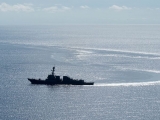 Category: International LawThe US communication added a voice to the common position of Vietnam, Malaysia, Philippines and Indonesia on consideration of UNCLOS as the sole legal basis for defining, in a comprehensive and exhaustive manner, the scope of their respective maritime entitlements in the South China Sea.
Category: International LawThe US communication added a voice to the common position of Vietnam, Malaysia, Philippines and Indonesia on consideration of UNCLOS as the sole legal basis for defining, in a comprehensive and exhaustive manner, the scope of their respective maritime entitlements in the South China Sea. -
Scarborough Shoal at the turn of the 20th Century: Debunking Myths
Category: PoliticsAs it might be difficult for China and the Philippines to defend their official claims over Scarborough as their own territory before the 20th century in an international court, both countries should engage in constructive negotiations over joint development. This is still the best option to avoid deterioration of the conflict for now and the years to come. -
Why Vanguard Bank and Why Now? Explaining Chinese Behavior in the South China Sea
Category: PoliticsDuring the course of my recent discussions with Vietnamese interlocutors, one question has recurred: after a period of prolonged quiet in Vietnam-China relations in the South China Sea (SCS), why has Beijing all of a sudden decided to take a stand at Vanguard Bank? And one could easily further ask why at the same time Beijing opened a new front by conducting a major military exercise at the Paracel Islands? I think there are several components to answering these questions. First, although Vanguard Bank represents the worst Vietnam-China tensions in the SCS since the Haiyang Shiyou 981 oil rig standoff in May ... -
China and the rules of engagement in Antarctica
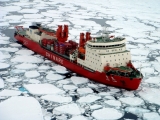 Category: CommentaryChinese repudiation of the rule of law in the Philippines v. China case resulted in, among other things, speculation about the country’s perceived – or real – interests and activities in Antarctica, where Australia has significant investment, and where respecting the rules of engagement with international law is paramount.
Category: CommentaryChinese repudiation of the rule of law in the Philippines v. China case resulted in, among other things, speculation about the country’s perceived – or real – interests and activities in Antarctica, where Australia has significant investment, and where respecting the rules of engagement with international law is paramount. -
Implications of the July 2016 Arbitral Tribunal Ruling
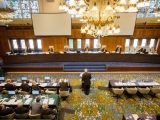 Category: South China Sea arbitration rulingFor a considerable time now efforts to manage disputes and promote cooperation in the South China Sea have been inhibited by the lack of an equitably defined geography of disputed and non-disputed maritime zones in the South China Sea. The Award rendered by the Tribunal on 12 July 2016 in the so-called South China Sea arbitration initiated by the Philippines against China has put an end to that situation, thus opening up new cooperation opportunities for states in the region.
Category: South China Sea arbitration rulingFor a considerable time now efforts to manage disputes and promote cooperation in the South China Sea have been inhibited by the lack of an equitably defined geography of disputed and non-disputed maritime zones in the South China Sea. The Award rendered by the Tribunal on 12 July 2016 in the so-called South China Sea arbitration initiated by the Philippines against China has put an end to that situation, thus opening up new cooperation opportunities for states in the region. -
International Law and the South China Sea
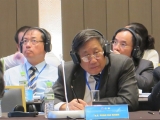 Category: VideosThis session assesses the utility of international law in managing and resolving the South China Sea disputes in the post-award context of the Philippines-China arbitration case at the Arbitration Tribunal set up under Annex VII of the UNCLOS. Arguably the long-awaited award that has surprised most, if not all, international observers has also changed the legal status quo in the South China Sea. What are the implications of the arbitration award for the South China Sea situation going forward? How might the Tribunal’s assessment of evidence, reasoning and conclusion in the Philippines-China case affect the claims of the parties directly involved ...
Category: VideosThis session assesses the utility of international law in managing and resolving the South China Sea disputes in the post-award context of the Philippines-China arbitration case at the Arbitration Tribunal set up under Annex VII of the UNCLOS. Arguably the long-awaited award that has surprised most, if not all, international observers has also changed the legal status quo in the South China Sea. What are the implications of the arbitration award for the South China Sea situation going forward? How might the Tribunal’s assessment of evidence, reasoning and conclusion in the Philippines-China case affect the claims of the parties directly involved ... -
The South China Sea Arbitration: No, It’s Not a PCA Ruling
 Category: South China Sea arbitration rulingOn July 12, 2016, an award in the arbitration case between the Philippines and China over the South China Sea was announced, which denied China’s “historic rights” in the South China Sea. As the award was released by the Permanent Court of Arbitration (PCA) in The Hague, the media reported that the PCA “ruled” the case, describing the award as a “PCA ruling.”
Category: South China Sea arbitration rulingOn July 12, 2016, an award in the arbitration case between the Philippines and China over the South China Sea was announced, which denied China’s “historic rights” in the South China Sea. As the award was released by the Permanent Court of Arbitration (PCA) in The Hague, the media reported that the PCA “ruled” the case, describing the award as a “PCA ruling.” -
Legal and Geographical Implications of the South China Sea Arbitration
Category: International LawIntroduction On 12 July 2016 the Arbitral Tribunal in in the case between the Philippines and China delivered its Award, following its earlier 29 October 2015 Award on Jurisdiction and Admissibility.[1] The Tribunal was constituted under Annex VII of the United Nations Convention on the Law of the Sea (LOSC),[2] having been initiated by the Philippines.[3] The Permanent Court of Arbitration in The Hague acted as the registry for the case and venue for hearings.[4] China, for its part, returned the Philippines’ notification of its claims, argued that the Tribunal lacked jurisdiction to hear the case, and has rejected the Tribunal’s Award.[5] The ... -
After the South China Sea Ruling
 Category: PoliticsThe long-awaited Tribunal’s merits ruling will come soon. What happens then? In Part 1, I examined Chinese legal opinions regarding the Philippines-initiated arbitration case against China’s expansive nine-dash line (NDL) claim in the South China Sea (SCS). In short, the intent of Beijing’s legal position paper on the Philippine case at the International Tribunal of the Permanent Court of Arbitration (PCA) in was to ensure the Tribunal judges ask the “right” (meaning “favorable”) questions in their deliberations. Beijing’s goal was to indirectly challenge the merits of the case without formally doing so — which would imply acknowledgment of the PCA’s jurisdiction.
Category: PoliticsThe long-awaited Tribunal’s merits ruling will come soon. What happens then? In Part 1, I examined Chinese legal opinions regarding the Philippines-initiated arbitration case against China’s expansive nine-dash line (NDL) claim in the South China Sea (SCS). In short, the intent of Beijing’s legal position paper on the Philippine case at the International Tribunal of the Permanent Court of Arbitration (PCA) in was to ensure the Tribunal judges ask the “right” (meaning “favorable”) questions in their deliberations. Beijing’s goal was to indirectly challenge the merits of the case without formally doing so — which would imply acknowledgment of the PCA’s jurisdiction. -
Thales successfully completes test firing of 70mm laser-guided rocket Tin tuần từ 18/1-24/1 Thales successfully completes firing of 70mm laser-guided rocket
 Category: Economy-(Vnexpress 18/1) Trung Quốc cảnh cáo phi cơ Philippines bay trên Biển Đông đang "đe dọa an toàn" các cơ sở của Trung Quốc; Philippines tính lắp thiết bị triệu đô theo dõi bay trên Biển Đông -(Thanhnien 18/1) Philippines xây căn cứ quân sự ở Biển Đông cho Mỹ thuê: Căn cứ quân sự ở vịnh Oyster được xây dựng như căn cứ “Subic nhỏ” của Mỹ trước đây ở Palawan; Tàu chiến Trung Quốc tập trận bắn đạn thật ở Biển Đông
Category: Economy-(Vnexpress 18/1) Trung Quốc cảnh cáo phi cơ Philippines bay trên Biển Đông đang "đe dọa an toàn" các cơ sở của Trung Quốc; Philippines tính lắp thiết bị triệu đô theo dõi bay trên Biển Đông -(Thanhnien 18/1) Philippines xây căn cứ quân sự ở Biển Đông cho Mỹ thuê: Căn cứ quân sự ở vịnh Oyster được xây dựng như căn cứ “Subic nhỏ” của Mỹ trước đây ở Palawan; Tàu chiến Trung Quốc tập trận bắn đạn thật ở Biển Đông -
China’s Maritime Assertiveness And Repercussions
 Category: PoliticsThe BBC-chartered aircraft flew 140 nautical miles (about 160 miles) from Palawan Island in the Philippines until it came within 12 nautical miles of Mischief Reef, according to the video.
Category: PoliticsThe BBC-chartered aircraft flew 140 nautical miles (about 160 miles) from Palawan Island in the Philippines until it came within 12 nautical miles of Mischief Reef, according to the video.
© 2016 Maritime Issues



